Police News
Super Campaign

Pages 5-7
Police picking up the pieces of a mental health crisis
Page 12-13
Run 4 Blue
Page 16-17, 28
Crossword Page 32
JULY|AUGUST 2023 PRINT POST PUBLICATION NO. PP100018976

WHY POLICE BANK? Because we’re for you Police Bank Ltd. ABN 95 087 650 799. AFSL/Australian Credit License No. 240018. 25 Pelican Street, Surry Hills NSW 2010. Wherever you are on your financial journey, banking with us means banking where you belong. Award-winning products and insightful service Receive your pay a day early when it’s deposited into a Police Bank account Call 131 728 or visit policebank.com.au
MANAGEMENT TEAM
Mr P. Gooley - Secretary
Mr P. Hannen - Asst. Sec. Organising
Ms K. Membreno - Asst. Sec. Industrial
Mr R. Del Vecchio - Asst. Sec. Admin
Mr A. Howell - Asst. Sec. Legal Services
Ms C. Prosser - EA and Events Coordinator
CPOB
Mr J. Goddard - Lead Organiser
Ms R. Neil - Senior Industrial Officer
MEMBER SUPPORT
Mr I. Johnstone - Member Support Coordinator
Mr. E Murphy - Welfare Support Officer
TEAMS
CENTRAL METRO/SOUTHERN
Mr M. Evans - Organiser
Mr T. McGregor - Industrial Officer
Ms. M Sessions - Industrial NORTH WEST METRO/NORTHERN
Mr. G. Price - Organiser
Ms A. Fleming - Industrial Officer
Mr L. Solomon - Industrial Officer
SOUTH WEST METRO/WESTERN
Mr R. Sheraton - Organiser
Mr P. Richardson - Industrial Officer
Ms. C. Palma - Industrial Officer
NON LAC (SPECIALISTS)
Mr A. Stokes - Organiser
Mr H. Crosby - Organiser
Mr J. Ludkin - Organiser
Mr A. Boromisa - Industrial Officer
Mr G. Doyle - Industrial Officer
Ms K. Young - Industrial Officer
Ms E. Hampson - Industrial Officer
LEGAL SERVICES
Ms K. Lally - Senior Coordinator
Ms A. Reece - MET Officer
Ms E. Hagan - MET Officer
Ms C. Jones - MET Officer
Ms J. Whalebone - In House Counsel

Ms C. Young – Solicitor
Mr. B. Lee – Solicitor
Mr D. Longhurst - Solicitor
Ms B. Golledge - Senior Legal Clerk
Ms S. George - Paralegal
Ms B. O’Reilly - Clerk
Ms C. Crasto – Clerk


RELATIONSHIPS & STRATEGY
Mr T. Bear - Manager RESEARCH
Mr A. Skinner - Research Manager
Dr K. Linklater - Research Officer
COMMUNICATIONS
Ms E. King - Comms Officer
Mr M. Rowland - Comms Officer
INFORMATION ORGANISING CENTRE
Ms K. O’Leary - Supervisor
Ms T. Fletcher - Ms N. Hawley
Ms K. Puckeridge - Ms A. Johnson
Mr H. Spiby - Mr J. Ryan
ADMINISTRATIVE SERVICES
Ms N. Scott - Supervisor Memberships
Ms J. Weber - Senior Admin Officer
Ms D. Green - Support Officer
EXTENDED LEAVE
Ms. C. Brett – Senior Admin Officer
Ms S. Minahan - Industrial Officer
Advertisers Alert: The Police Association of NSW is the publisher of PANSW Police News. The Police Association does not accept any responsibility to any advertiser or consumer in respect to advertising appearing in PANSW Police News. For enquiries re advertising in this publication, please contact the publishers via: elyssa.king@pansw.org.au


■ Executive: Kelly Hallinan p2
■ President's message p3
■ Concessional Cap Campaign (Fix Our Super) p5-7
■ 'Pulse' trial update p9
■ How to advertise Acting Appointments p10-11
■ Picking up the pieces of a mental health crisis p12-13
■ Optional Disengagement: current and future rounds p14-15

■ Run4Blue poster and story p16-17, 28
■ Police investigating Police p18-19
■ Police Rights p21
■ Legacy: Remembering Tara p23
■ PANSW's cancer support partner has a new name: Osara p25

■ FACS and Carer's Leave p26-27

■ Mal Unicomb: Wall-to-Wall correspondant p29
■ Peter Jones and the 2022 floods p30-31
■ In Conversation with Alison Dixon p32
■ Crossword p32
Cover
A close-up photo of the 'Fix our Super' badge, designed for officers who work in plain clothes, but still want to send a message to the Federal Government.
Disclaimer: Police Association of New South Wales (“Publisher”) advises that the contents of this publication are the sole discretion of the Police Association of New South Wales and the publication is offered for information purposes only. The publication has been formulated in good faith and the Publisher believes its contents to be accurate, however, the contents do not amount to a recommendation (either expressly or by implication) and should not be relied upon in lieu of specific professional advice. The Publisher disclaims all responsibility for any loss or damage which may be incurred by any reader relying upon the information contained in the publication whether that loss or damage is caused by any fault or negligence on the part of the publisher, its directors and employees. Copyright: All advertisements appearing in this publication are subject to copyright and may not be reproduced except with the consent of the owner of the copyright. Advertising: Advertisements in this journal are solicited from organisations and businesses on the understanding that no special considerations other than those normally accepted in respect of commercial dealings, will be given to any advertiser.
INDIGENIOUS
ROUND - CROSSWORD ANSWERS DOWN 1. TRACKING 2. ARCHIBALD 3. DIDGERIDOO 4. DAVIDUNAIPON 5. CENSUS 11. NIKKIWEBSTER 12. EORA 13. SONGLINES 14. BOOMERANG 15. BANGARRA 16. WOLLONGONG 17. CRICKET 19. DREAMTIME ACROSS 6. ULURU 7. CATHYFREEMAN 8. HUMBUGGING 9. LIBERAL 10. MABO 11. NORFORCE 14. BENNELONG 18. STOLENGENERATION 20. HERITAGE
CONTENTS PANSW Police News July-August 2023 1 Contents
103 / No.4 July - August 2023
@PoliceAssocNSW
linkedin.com/company/pansw THE POLICE ASSOCIATION PUBLISHES THE PANSW POLICE NEWS IN ACCORDANCE WITH ITS PRIVACY STATEMENT WHICH IS AVAILABLE ON THE ASSOCIATION WEBSITE. PANSW POLICE NEWS IS THE OFFICIAL JOURNAL OF THE POLICE ASSOCIATION OF NEW SOUTH WALES PO BOX A1097, SYDNEY SOUTH, NSW 1232 / (02) 9265 6777 / WWW.PANSW.ORG.AU / POLICENEWS@PANSW.ORG.AU ISSN0047-9934 PUBLISHED SIX (6) TIMES A YEAR. CONNECT WITH YOUR ASSOCIATION, FOLLOW NEWS ITEMS ON PANSW SOCIAL MEDIA:
Vol
facebook.com/pansw.org
@policeassociation_nsw
Executive Committee
Executive Officers
Kelly Hallinan
Executive Member Southern Region Area 2
■ I joined the NSWPF in August 2001 and commenced my duties at Lake Illawarra. I remained there in General Duties for three years before transferring to the Prosecutions Unit. I was with the Prosecutors for three years and travelled around the Southern and Metropolitan regions.
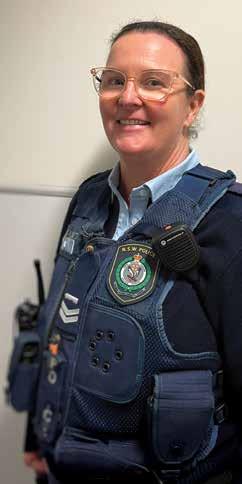
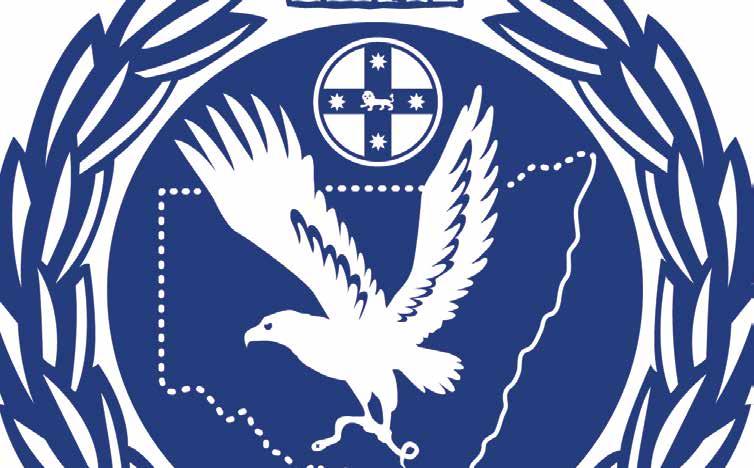
In 2007, I transferred back to Hurstville, where I remained in General Duties and enjoyed the work and flexibility of the roster.
In 2010, I returned to Lake Illawarra after falling pregnant. During this time, I engaged with the PANSW concerning my treatment regarding shifts. I was so impressed with the Association that I became involved with the local branch. The same year, I worked on a flexible work arrangement, advocating for inclusivity regarding family needs.
I have remained at Lake Illawarra since 2010 and moved from brief handling back to General Duties. During this time, I completed a Bachelor of Law and became a practising Solicitor. I was the Chair at Lake Illawarra until I won the


















Southern Region Area 2 position.
I always wanted to be on the Executive and was lucky and grateful to have won the vote. My initial focus is establishing myself within the role and adapting to the position. I want to be a driving force for change, assisting and directing members to the most appropriate help available. I am excited to get to know the delegates in my area and help them whenever needed.
The major ongoing challenge for our members will continue to be retention. We can only continue to offer support to help them navigate these challenges as they manage their duties, at times with restricted capacity due to staff shortages. In addition, ensuring our members are outfitted with the most up-to-date equipment and tech will remain a priority.
I am a mother of two boys and travel extensively to support them when they compete in sports at a representative level. I am still a Senior Constable and have been for several years. General Duties policing is what I love and hope to be able to do for many years to come.
2 PANSW Police News July-August 2023 EXECUTIVE WESTERN REGION Chris Jordan
SOUTHERN REGION AREA 2 Kelly Hallinan NORTHERN REGION AREA 1 Paul Ireland SOUTHERN REGION AREA 1 Vacant NORTHERN REGION AREA 2 Darren McCaughey SW MET REGION AREA 1 Stephen Waddington NW MET REGION AREA 1 Aaron Rynehart NW MET REGION AREA 2 Alison Dixon SW MET REGION AREA 2 Matt Thomson COMMISSIONED OFFICERS REGION Matthew Webb CENTRAL MET REGION AREA 2 Graham Condon CENTRAL MET REGION AREA 1 Oliver Behrens NON LAC REGION AREA 3 Peter Gurr NON LAC REGION AREA 1 Stephen McDonald NON LAC REGION AREA 4 Peter Foran NON LAC REGION AREA 2 Christine Woods TREASURER Roger Campton PRESIDENT Kevin Morton VICE PRESIDENT Ian Allwood
■ As I sit at my desk preparing the President’s Message for this edition of Police News on Thursday, 25 May 2023, I reflect on the past seven days leading up to this date. I’m reminded of how challenging our job is as police officers and of the many roles we are expected to fulfill, often in the absence of other qualified healthcare professionals with the required skill set, in performing our duties.
How thousands of incidents are attended across this state by our men and women in blue every day, where the decisions they make and the actions they take in a split second can be dissected and played out in media, public and political forums as a point scoring exercise. With several Critical Incidents occurring in the last month, our Organisers have been at the coalface, supporting our members through some of the most confronting moments they will face in their careers.
Yet in the face of mounting challenges and public criticism, we continue to show up - to respond to the call to serve and protect. As a Police Officer of 33 years, I still say that I couldn’t think of anything else I’d rather do. Yes, every job requires you to face the unknown with unexpected circumstances, and there will always be individuals that will say, ‘You could have done it better.’ But I say that the men and women of the New South Wales Police Force are still, by far, the most professional police force in the country, if not the world.
We will learn, adapt, and move forward as we have always done during difficult times. It’s what we do, and it is enshrined in our DNA. We will always ensure
that our focus remains on serving our communities and keeping the people of New South Wales safe.
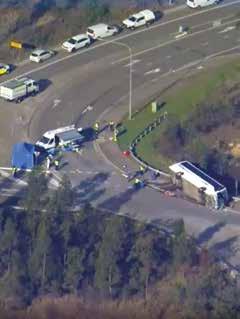
Concessional Cap
Our ongoing efforts concerning the Superannuation Contributions Concessional Cap and our campaign to resolve this issue with the Federal Labor Government are outlined in the pages ahead. As we have experienced over the past decade of attempting to fix this problem, making grounds with a common-sense approach has been a challenge as we continue to be blocked by a wall of bureaucratic resistance. This issue affecting more and more members each year has gone on long enough. Commencing in March this year after our launch in Parliament House in Canberra, we have been in contact with every stakeholder across all sides of the Federal Government, pushing for the desired outcome that would see the necessary legislation implemented
to exclude the NSW Police Force Death and Disability Insurance Premiums from counting towards the Concessional Cap.
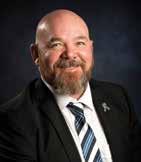
You will have seen further engagement with you, the members, to assist in applying that pressure, with campaign elements shared across our communications channels. The PANSW Executive and I proudly wear the ‘Protect Our Future, Fix Our Super’ badges and patches. I strongly encourage you to wear these items in the targeted areas where these have been distributed. Tell everyone who will listen, from members of the public to your local political representative, about what the Federal Government is doing to NSW Police Officers by failing to resolve this issue.
Forums
We will see face-to-face forums recommence in the later part of the year. In the lead-up to Conference 2023, our staff will continue to engage with you, the members, on the issues that matter most. These forums are a fantastic opportunity to gather and expand your branch networks. I encourage you to get along wherever possible.
PANSW President Kevin Morton
PANSW Police News July-August 2023 3 PRESIDENT’S MESSAGE
'The most professional police force in the country, if not the world'
NSW POLICE, FIRST AT THE SCENE OF A HUNTER VALLEY BUS CRASH, WHICH INVOLVED MULTIPLE DEATHS
PERSONAL INJURY CLAIMS
Personal injury claims can be confusing and unpredictable. You need a lawyer experienced enough to take control and caring enough to put you at ease. Someone you can trust, backed by a team they trust.

It’s a matter of trust.
stacksgoudkamp.com.au
1800
IT TAKES A CONFIDENT, CARING HAND.
25
1800
Concessional Cap Campaign
Our proud uniform
Members working together and our strength as a collective empowers us to fight to ensure police officers and their families have healthy, happy lives with financial security.
Thank you to everyone who supports and continues to support the 'Protect our Future | Fix our Super' campaign. Whether you proudly wore the Patch/ Badge on your uniform, informed interested community members about the campaign, or shared our online campaign materials on Facebook, you helped.
At the time of writing, the campaign is still ongoing as the Federal Government is still dragging its feet. The PANSW will continue to fight for this issue. With a show of strength from all of you, the Concessional Cap problem must be fixed. The Federal Government should remember that.
How did we get here?
The ability to contribute to your retirement savings is one of the most important issues to any member who joined after 1988. Every Australian can decide whether to put some of their hard-earned money into their
superannuation account to ensure their family is financially secure after retirement. That is to say, every Australian except NSW police officers.
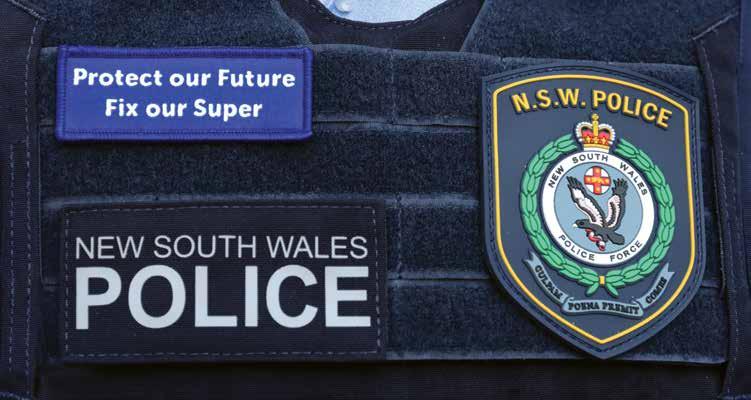
The PANSW has been advocating to resolve the Concessional Cap issue for members for over a decade. It took on a new urgency recently as the cost of the Death and Disability insurance scheme increased and made the impact of the Concessional Cap issue more severe.
The campaign ramped up again in March, with PANSW President Kevin Morton and Commissioner of Police Karen Webb leading a delegation to Canberra to tell Federal politicians "a solution must be found. It must be found this financial year, and it must be a just outcome for our members."
We rallied support in Canberra and around Australia. Members of the crossbench of the Federal Parliament joined the cause. The Australian Council of Trade Unions wrote to the Federal Government and made it clear the union movement in Australia supports police officers' right to save for their retirement.
NSW Premier Chris Minns, NSW Treasurer Daniel Mookhey and NSW Police Minister Yasmin Catley all support the fix. The Welfare Rights Centre supports police accessing their entitlements and
not being punished for the costs of a mandatory insurance product. But still, the Federal Government is dragging its feet.
Public support
During a challenging time for police, seeing the public acknowledge your value to the community and recognise that you deserve a just outcome was heartening. With the Federal Government yet to commit to a fix, the PANSW increased the public visibility of its pressure on the Government. Throughout May, the PANSW demonstrated to the public that:
• Police officers put their safety on the line to protect the community,
• Because of the dangers police face, mandatory Death and Disability insurance is expensive,
• That expense is the root cause of the Concessional Cap issue, and
• It is only fair and just that the impact of this problem is fixed.
We told the stories of members who suffered significant danger and harm in the line of duty and how that danger prevented them from saving
CONCESSIONAL CAP CAMPAIGN
PANSW Police News July-August 2023 5
'PROTECT OUR FUTURE, FIX OUR SUPER' PATCHES HAVE BEEN HANDED OUT IN AREAS WHERE FEDERAL LABOR HOLD THE SEAT
for retirement. The campaign received positive engagement from the public. Throughout the public campaign, media attention turned to a critical incident that attracted scrutiny and criticism, both of the incident and policing in general.
It was encouraging to see that at that time, those that support police and the work you do for the community turned to our members' voices to hear the stories of the danger you face and the impact these incidents can have on you. "We will not stand for this."
Never giving up on achieving this fix for members, PANSW Secretary Pat Gooley returned to Canberra to tell Federal Labor politicians:
"It's just criminal that NSW police officers can't contribute to their own retirement with their own money. It's only because the job they do protecting the community is so dangerous, and the insurance premiums are so high. This Labor Government has promised for ten years while they were in opposition to fix this. The Budget this week announced a number of measures to help working families, and particularly working mothers. All those benefits are denied to our members because of the Concessional Cap issue … this is unacceptable. This Government says 'no one held back and no one left behind.' Every police officer in NSW is being held back, and our working families are being left behind. We will not stand for it and will continue to lobby for a resolution because ten years is too long to wait."
Strong and diverse allies
With fairness on our side, we are backed by a strong and diverse cohort of allies, including members of the Federal Cross Bench, the NSW Premier, Treasurer and Police Minister, and community stakeholders.
The most active of our supporters may surprise some.
Greens Senator David Shoebridge and the PANSW haven't always seen eye-toeye and had some clashes for the ages when he was in NSW State Parliament.
Mr. Shoebridge is now in Federal Parliament, and regardless of history or party politics, he supports the right of police to have protections for them and their family if they are injured and contribute to their retirement savings.
Mr. Shoebridge joined PANSW Secretary Pat Gooley and publicly supported the PANSW Campaign to fix our super. Senator Shoebridge said:
"At different times, we have disagreed on some police and policy matters, but on this one, we're in lock-step. If you're injured in a dangerous occupation, you need to have the insurance there so that you and your family can be protected ... but bizarrely, police are being basically told they're paying for it out of their own pocket. It's being treated as income for superannuation purposes and they are being double taxed, on paying for an insurance product that's essential to keep them safe at work. You could not make this up. It's a bureaucratic mess. It's a bureaucratic mess that largely keeps bureaucrats employed. It's creating a hell of a lot of
uncertainty, and particularly for senior women, that's where it's really hurting. Our message is very clear. The Federal Government needs to step up and fix it."
Senator Shoebridge put his money where his mouth is, questioning the Federal Government on this issue in Budget Estimates and supporting the idea of legislative amendments to fix our super.
Activism in Labor seats
If the Federal Government doesn't act, our members will. Approaching the sitting of Federal Parliament in June, Labor politicians would have seen police officers in their electorates wearing the "Protect our Future | Fix our Super" patches and badges.
PANSW Organisers distributed the patches and badges in crucial Labor held seats, and our members showed their support. This was despite the NSW Police Force's attempt to ban you from wearing a small patch on your uniform. The Acting Commander of the NSW Police Protocol Unit issued an email reminding police of the policy around badges from outside the NSWPF. It was disappointing that sections of the NSW Police Force hierarchy got in the way of members working to protect their future.
The Commissioned Officers Branch of the PANSW is a strong supporter of the Concessional Cap campaign, so the attempt to ban officers from wearing the campaign patch should have been better thought through by anyone behind that decision. But your commitment and activism prevailed, and we are proud of the support and effort members put in to make their voices heard. We still have more work to do, but we will not give up. Protect our Future | Fix our Super.
6 PANSW Police News July-August 2023 CONCESSIONAL CAP CAMPAIGN
"The Federal Government needs to step up and fix it"


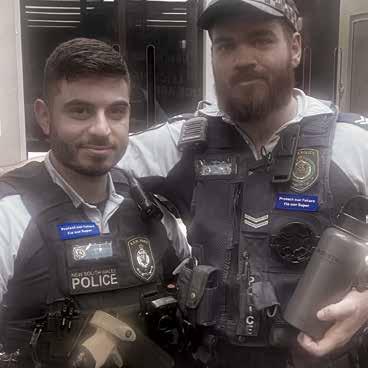

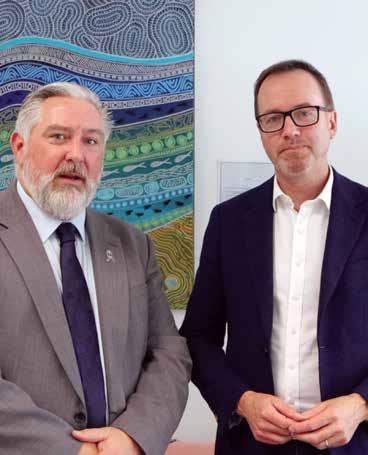
POLICING IS A DANGEROUS JOB. OFFICER'S DEATH & DISABILITY INSURANCE SHOULDN'T BE AT THE EXPENSE OF THEIR SUPER AND ENTITLEMENTS. PANSW PRESIDENT KEVIN MORTON'S MESSAGES TO MEMBERS ABOUT THE PATCH CAMPAIGN WITH A BACKGROUND IN INDUSTRIAL LAW, SENATOR DAVID SHOEBRIDGE WAS QUICK TO SUPPORT NSW POLICE, URGING THE FEDERAL GOVERNMENT TO FIX THE 'BUREACRATIC MESS'. 'PROTECT OUR FUTURE, FIX OUR SUPER' PATCHES HAVE BEEN HANDED OUT IN AREAS WHERE THE GOVERNMENT HOLDS THE FEDERAL SEAT. HAYDEN EDWARDS GAVE PANSW PERMISSION TO USE FOOTAGE THE CENTRAL STATION ASSAULT ON HIM, DEMONSTRATING THE DANGERS NSW POLICE OFFICERS FACE DOING THEIR JOBS. PANSW Police News July-August 2023 7 CONCESSIONAL CAP CAMPAIGN



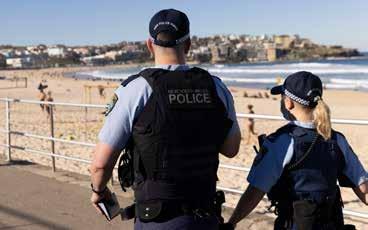



If you are injured in a car accident, in a public place, or at work including PTSD you need to ensure your rights are protected and your entitlements secured. Carroll & O’Dea Lawyers are experts in personal injury law and panel solicitors for the NSW Police Association. Call us today to find out about your legal rights. NO WIN. NO FEE. NO OBLIGATION Liability limited by a scheme approved under Professional Standards Legislation. © Carroll & O’Dea Lawyers Level 18, St James Centre, 111 Elizabeth Street, Sydney, New South Wales, 2000 1800 059 278 enquiry@codea.com.au codea.com.au Personal Injury Specialist Have you been injured while on duty? Unlock your corporate membership perks Police Association members who purchase an eligible Bupa policy will have access to special corporate rates and fantastic benefits from Bupa: • Accident Happen refund for selected products* • 100% back on your first massage, physio and chiro services on selected products, up to yearly limits** • Kids Gap free on most dental, Physio, chiro, podiatry Consultations, for selected products at Members First Providers, up to yearly limits*** Contact us today to learn more or scan the QR code to join or get a quote *Available on Corporate Basic Plus Hospital, Corporate Bronze Plus Hospital, Corporate Silver Plus Mid Hospital, Corporate Silver Plus Extensive Hospital and Corporate Gold Hospital. Accident definition: An unforeseen event, occurring by chance and caused by an unintentional and external force or object resulting in involuntary hurt or damage to the body, which occurred in Australia, which requires, within 72 hours of the event, medical advice or treatment from a registered medical practitioner other than the policy holder and, if necessary, any further medical treatment where such admission (including any readmission) or treatment must be within 180 days of the event. **Excludes physiotherapy classes and group sessions, and chiropractic X-rays depending on level of cover. Waiting periods, fund and policy rules apply. ***For most items covering dental, physio, chiro and podiatry consultations. Available on Corporate Benefits 60, Corporate Benefits 70 and Corporate Benefits 80, when taken with hospital cover on a family membership. Waiting periods, fund and policy apply. Child dependents only. Excludes orthodontics, orthotics and hospital treatments. Terms and conditions apply Call us on 1300 662 074 Scan the QR code below to join or get a quote Visit a Bupa Retail Store
Pulse Update
From 1st July 2023 all NSW Police Force employees can access the Early Access Treatment Initiative (EATI).
What is the EATI?
The Early Access Treatment Initiative is one of the new programs under PULSE. It will cover any out-of-pocket expenses after the Medicare rebate for external psychology appointments. More details about the out-of-pocket reimbursements can be found on the Medicare website.
Who can access the EATI?
All NSW Police Force employees can take advantage of the EATI.
How do I access the EATI?
First you will need to have a chat with your GP about obtaining a mental health treatment plan. Then you simply choose an allied health mental service professional (AHMSP), your GP can help you choose the right person so you can make your first appointment.

Three easy steps
1. Pay for the service provided by your chosen AHMSP and obtain a receipt.
2. Obtain your Medicare Claims History statement.
3. Head to Blue Portal and upload copies of both documents onto SAP so you can be reimbursed for any out-of-pocket amount.
When am I eligible for reimbursement under EATI?
Any treatment you receive after July 1st 2023 can be claimed. You might like to consider starting a conversation with your GP now to be organised, booked in and ready to go from 1st July 2023.
Reminder about Cross Government Work Trials
What is a work trial?
The work trial is a 12-week program endorsed and supported by the NSWPF insurer’s EML. This program provides an opportunity for officers to obtain experience in another NSW Government agency and gain confidence doing other work using their existing transferrable skills. The program will not affect officers undertaking further work trials with their rehabilitation providers.
Who can access it?
Police officers who have an accepted compensable injury (i.e. officers who are receiving weekly payments). The work trials are open to rural and metropolitan sworn officers in the process of transitioning out of the NSWPF or who
have left within the past two years. What are the benefits?
• While there is no guarantee of a permanent placement, if an officer obtains a permanent role with another NSW Government organisation prior to medical retirement, their accrued leave entitlements will be transferred with them.
• Officers are fully supported by the deployment officer, career transition officers, the rehabilitation provider, and the host agency supervisor during the trial.
Who can I contact for more information?
Deployment Officer
#PCC DEPLOYMENT
Career Transition Unit
#PCC CAREERTRANSITION
If you have a question that isn’t covered on the PULSE intranet page, send an email to PULSE@police.nsw.gov.au and the team will get back to you.
REPUBLISHED WITH PERMISSION FROM POLICE MONTHLY.
PANSW Police News July-August 2023 9 PULSE
Acting Appointments & advertising
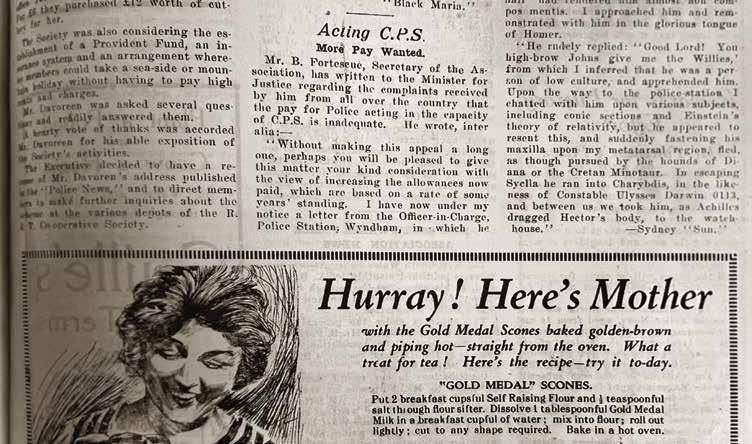
Members will have seen recent information distributed by Assistant Commissioner Dean Smith regarding Acting Appointments and the advertising requirements when these opportunities arise.
■ The PANSW was instrumental in making inclusions to the September 2021 Acting Appointment and Secondment Manual relating to incremental progression and ensuring fairness and transparency for acting opportunities that arise. While we advocated for periods of less than six months, the position adopted by NSWPF was a minimum six-month period for it to be counted.
Before this policy update, members who undertook periods of higher duties (except for a Section 67 appointment) did not have that time considered for incremental purposes during the acting appointment and if they were subsequently promoted.
The PANSW advocated for amendments to the policy, which have been included in the new Acting Appointments and Secondment Manual (the Manual), which
now enables the following:
• Incremental progression during the acting appointment period
• Incremental progression and recognition of service at the time of promotion
• Recognition of service for promotion to the next rank
The requirements to enable access to the above entitlements are in the Manual and summarised below.
1.3.3 Incremental progression (during the acting appointment period)
Officers acting in a higher graded position for a period of no less than 12 months are entitled to incrementally progress to the next level of the rank they
are acting in, in circumstances where:
• The period of acting appointment was continuous in the same position for 12 months, or
• Where the officer performs multiple acting appointments of the same duty type (the minimum term for each period of recognition is six months), and the cumulative total of these periods is 12 months in a two-year period.
For example – the officer is appointed to act in a position for six months. Three months after the conclusion of that acting period, the officer is appointed to act in another position for nine months. The two periods occurred during a two-year period, so the officer would be entitled to incrementally progress for the final three months of the second acting appointment.
IDEAS AND ADVERTISING FROM PAGE 33 OF THE JULY 1921 ISSUE OF THE POLICE ASSOCIATION'S MONTHLY NEWS MAGAZINE 10 PANSW Police News July-August 2023 INDUSTRIAL
Note: incremental progression as set out previously will only be approved where the applicable advertising requirements in the How To Fill Matrix have been complied with.
1.3.4 Incremental progression and recognition of service (at the time of promotion)
Once promoted, officers who have acted at the promotional rank for a period of no less than 12 months within two years of the promotion date are entitled to commence at a higher incremental rate in circumstances where:
• The period of acting appointment was continuous in the same position for 12 months (within two years of the promotion date), or
• Where the officer performs multiple acting appointments of the same duty type (the minimum term for each period of recognition is six months), and the cumulative total of these periods is 12 months within a two-year period of the promotion date.
Note: incremental progression as set out above will only be approved where the applicable advertising requirements in the How To Fill Matrix have been complied with.
1.3.5 Recognition of service for promotion to the next rank
Once promoted, officers who have acted at the promotional rank for a period of no less than 12 months within two years of the promotion date are entitled to recognition of service at the promotional rank for promotion to the next rank in circumstances where:
• The period of acting appointment was continuous in the same position for 12 months (within two years of the promotion date), or
• Where the officer performs multiple acting appointments of the same duty type (the minimum term for each period of recognition is six months), and the cumulative total of these periods is 12 months within a 2-year period of the promotion date.
For example – a substantive Sergeant (General Duties Supervisor) is appointed to act in an Inspector (Duty Officer) position for 12 months. At the conclusion of the 12-month acting period, the
Sergeant is promoted to Inspector (in a Duty Officer position). The 12-month acting appointment at the Inspector rank will be recognised as service for the purpose of eligibility for promotion to the rank of Superintendent.
Note: recognition of service as set out above will only be approved where the applicable advertising requirements in the How To Fill Matrix have been complied with.
You will note the particular reference to compliance with the applicable advertising requirements per the matrix. The NSWPF has advised that they will only accept requests for recognition of incremental level if the advertisement complies with the relevant requirement, as specified below. Therefore, members need to ensure that if they are in an acting appointment opportunity at present or are seeking to undertake one, it needs to comply with the advertising requirements based on the length of the appointment to be recognised for incremental progression and recognition of that period.
Commanders have been reminded of the requirements, so members need to ensure that when applying for acting appointments that they are appropriately advertised when it comes to recognising that acting period for a bump in an increment or recognition of that period. If your command is not advertising acting appointments appropriately, please raise this issue through your local branch of PANSW so this can be rectified.
The following is a summary of the “How to Fill Matrix”:
Estimated length of appointment effects the advertising requirement:
Up to 6 weeks - N/A
Between 6 weeks and 3 months
Command wide expression of interest
Between 3 months and 6 months
Region/equivalent expression of interest
Between 6 and 12 months
Statewide expression of interest
Please note:
• Acting appointments may be advertised beyond the level required – the above are the minimum requirements.
• The above relates to the person in the position – i.e. if the vacancy is for six months, it may be filled with two officers
from a Region/equivalent EOI for a maximum period of three months.
• If the length of the vacancy is initially underestimated and then needs to continue, the advertising must be complied with at that time. For example: if the substantive officer is anticipated to be absent for a period of two months, this may be filled via Command EOI. If it becomes apparent during that period the substantive officer will be absent for a period of greater than six months, a statewide EOI should occur as soon as possible.
Why is this important?
• Principles of merit and broad access to opportunities must be made available across Commands/the broader NSW Police Force. This is consistent with the intent of other related policies, such as at the Capability Development and Rotation policy.
• The policy provides recognition of service for incremental progression and time on rank (for promotion), subject to certain criteria. The advertising requirements must be met for eligible officers to receive recognition (i.e., a statewide EOI occurred).
What should officers do?
Officers are encouraged to engage with their Commander/Manager regarding the length of their acting appointment where they think advertising requirements still need to be met.
The PANSW has advocated on behalf of several officers where their period of relieving has not been recognised due to errors with the process. This needs to be rectified, and officers are actively encouraged to ensure compliance with the advertising requirements for positions to ensure officers can access the incremental progression provisions, which we advocated strongly for in the policy.
Have questions?
Contact us on 9265 6777 or info@pansw.org.au
PANSW Police News July-August 2023 11 INDUSTRIAL
Mental Health Crises ... and police asked to pick up the pieces
When an entire system fails so many people, why are only police to blame?
■ In 2015 an unwell man, armed with a kitchen knife, chases work colleagues inside an office. They barricade themselves behind a closed door. The man tries breaking it down, then turns the knife on himself, slashing both wrists. Bleeding, he leaves the building. Soon after, members of the public

see a bloody man on the street pacing erratically, holding a knife. Police are called. They arrive in less than a minute. Confronted by the armed man, officers draw their firearms. They instruct the man to put down the knife. Instead, he immediately moves toward them. Police move back, repeating the instruction.
The man doesn't comply. Knife raised, he corners an officer and pushes forward. He is told one last time to drop his weapon. At this point, the armed man is only 2.4 metres from the officer. Room for safety has disappeared. Firearms are discharged.
12 PANSW Police News July-August 2023 ANALYSIS
Seconds of police action lead to years of examination, while decades of a mental health system failing people in need does not prompt the same urgency.
After that day's dangerous and traumatic events, the involved officers went through a process that took almost three years. They had to endure media attention, a Critical Incident investigation, Coronial inquests, and then renewed media coverage when reports are published.
During that time, the officers' selection of tactical options and the nature of the officers' communication with the individual were examined. The Coroner made a recommendation to the Commissioner of Police "that consideration be given to the greater integration of mental health informed training into tactical options training with an emphasis on specific de-escalation techniques practiced by role play exercises."
This individual had a history of mental illness across many decades. He had raised his psychological injuries with his employer. He had been hospitalised for suicidal ideation or alcohol issues, displayed behavioural issues, intoxication or aggression at work, had been assessed for his fitness to return to work, and had done so on all occasions. He spoke to colleagues about reading material on how to kill them.
On the day of the incident, he was intoxicated at work, had engaged in conflict with colleagues, and purchased the kitchen knife from a supermarket while visibly intoxicated.
Raising this history is not to criticise those that have those experiences or the people involved on that day; it is to show that police officers are called in to intervene in mental health crises at the end of years or even decades of mental illness, opportunities to support a person to recover, opportunities missed, and escalating risk. Police are called in with no influence over that history or context, possibly no knowledge of it, at a point where the situation is already dangerous and complex.
There are many incidents where the underlying causes have important similarities to this case and where police
officers face years of media attention, speculation, criticism, investigation, coronial hearings, questioning, and potentially the risk of losing their job or even criminal liability.
Tragically, in the past five years, 68 NSWPF Critical Incidents (not all resulting in death) have involved interaction between a person in a mental health crisis and police officers. This constitutes 43% of all NSWPF critical incidents.
That prevalence has caused some to be highly critical of individual police officers and the policing profession in general, calling into question police officers' training on mental health, its integration with tactical options, and de-escalation techniques.
It is tragic when a person loses their life; every opportunity to prevent that is worthy of consideration.
Why, though, in the frenzy of criticism, speculation and armchair analysts, is there so few people questioning; why do we force our police to keep intervening in so many incidents like this?
Criminalising mental illness
Why is society giving up the challenge and taking for granted that the response to mental health is police attendance rather than improving mental health?
The focus on constantly requiring police to learn new, highly complex skill sets reflects a society that is giving up on mental health services and support. Instead of protecting its people from mental health crises, it expects police to respond to 000 calls and act as pseudo-mental health clinicians, social workers, aged care workers, child support services, youth diversionary coordinators and crime preventers while also providing one unique characteristic – the training and ability to use a variety of tactical options, including use of force like tasers and firearms.
Mental illness should not be criminalised – a society that relies on police so heavily to respond to mental health crises is letting down people with a mental illness and the police that are required to respond to these crises.
2 out of 5 (44%) Australians will experience a mental health disorder during their lives. If that is us or someone
we care about, we want people to receive a health response that supports them to stay well in the community. We don't want mental health to be treated like a crime, with urgent police responses required.
Doing the same thing but trying to avoid dangerous circumstances and tragic outcomes has police paddling against the current. Police officers respond to well over fifty thousand mental health-related incidents a year. When a Critical Incident occurs, the typical response is to criticise police training, call for more training (without the funding or operational resources being provided to deliver that), or putting forward the Police Ambulance Clinicians Early Response (PACER) program as a solution.
The telling discrepancy of the PACER program is that the clinicians that support the police in this program are only available for eight hours per day, once again requiring a police fix to a health problem.
In response to recommendations regarding increased training, "the NSWPF have expressed some concern that NSW Police Officers may be relied upon as experts when responding to persons suffering a mental health crisis, instead of appropriately trained medical professionals." (Law Enforcement Conduct Commission - Five Years (2017 – 2022) of Independent Monitoring of NSW Police Force Critical Incident Investigations).
Police are the universal 24/7 problem solvers. But they are increasingly being asked to do the work of other agencies and professions, often in dangerous circumstances. And then individual officers and the policing profession are being criticised when those dangers occur. So why is the entire system failing so many people, but only police are to blame?
It's time for police officers to be supported to do the ever-increasing job we ask of them, rather than loading them up with more complex problems to solve on their own and then criticising them when tragedy occurs.
PANSW Police News July-August 2023 13 ANALYSIS
Seconds, minutes, years and decades
Optional Disengagement Scheme
For several years, the PANSW and its members have advocated for a scheme that allowed officers to exit the NSWPF with dignity at a time of their choosing. In May 2021, the NSW Government approved an allocation of funding for the pilot Optional Disengagement Scheme. The Scheme is funded to run over three financial years and has already successfully refreshed the NSWPF internal ranking structure and promotion base.
Round 2
Round 2 of the ODS opened for Expressions of Interest (EOI) on 18 January 2023. The second round attracted even more interest than the first round. The EOI round closed on 24 January 2023, with 710 EOIs submitted.
A total of 235 officers will exit the NSWPF from Round 2. It is expected that at the time of publication, all officers will have exited. See graph #1 opposite for last days of service and numbers exiting
Similar to the first round, Round 2 has successful applicants with representation from all eligible ranks from across the state. See graph #2 opposite for areas of policing and numbers exiting.
The officers had different years of service ranging from 10 years up to 43 years of service, and it is an exciting time for those who now move towards a new career path. Most officers have already engaged with the career transition provider for support. Some will have ongoing meetings with their career coach, working on personal branding and strengthening interview skills; others will seek assistance with their resume and gain a better understanding of their transferable skills.
Officers often need to be made aware of the breadth of the abilities and experience they develop while performing their duties. These transferable skills include (but are not limited to) enhanced communication and problem-solving skills, the experience
of working within teams, following policies and procedures, understanding compliance obligations and quick decision-making. Never underestimate the skills that you have as police officers that other employers are very desirous of. See graph #3 opposite for years of experience
Round 3
The third and final round of the pilot of the ODS will open in January 2024. Officers who are interested in submitting an EOI are reminded they must maintain their eligibility as per the ODS Charter and the ATO Class Ruling 2021/89:
To be eligible for the Scheme, you must satisfy the following criteria:
• are a current serving nonCommissioned or Commissioned Officer (other than a Probationary Constable)
• having completed a minimum of 10 years of continuous service (any previous service is not recognised for this purpose)
• are under pension age at the time of terminating employment.
Officers will not be eligible for this Scheme who:
• have submitted an intent to resign or retire from 1 July 2021
• are subject to a process that may result in their retirement or removal
• are or become the subject of an active
investigation or conduct action under Parts 8A or 9 of the Police Act 1990 • are in receipt of any weekly Workers' Compensation benefit payments under Division 2 of Part 3 of the Workers Compensation Act 1987 (NSW).
Additionally, officers who have been out of the NSWPF (e.g., on secondment/ career break/LWOP) for periods of greater than 12 months, whether on any form of paid or unpaid leave or secondment, must return to NSWPF duty, resume and remain on duty to be eligible to participate in the Scheme.
Relevant information is available on the NSWPF ODS intranet page, including the ODS Charter, ATO Class Ruling 2021/89, payment guide and frequently asked questions. All interested officers are encouraged to make themselves aware of the available information and monitor for ongoing updates.
Importantly not all officers who express an interest in the ODS will be offered an exit in this final pilot round. Officers who are interested in a career change within or away from NSWPF are encouraged to consider all options available to them. The NSWPF intranet has vocational tools, EAP offer career change advice/support and as a result of the vacancies created from ODS, some officers may wish to consider internal career opportunities as they become available via lateral transfer, mobility, or promotion.
14 PANSW Police News July-August 2023 ODS
REPUBLISHED WITH PERMISSION FROM POLICE MONTHLY.
Capability Performance & Youth Central Metro Communication Services Counter Terrorism & Special Tactics Finance & Business Services FETS North West Metro Northern O ce of the Commissioner O ce of the General Counsel People & Capability Police Property Group PPLEC Police Transport & Public Safety Professional Standards South West Metro Southern State Crime State Intelligence Technology Command Tra c & Highway Patrol Western 5 0 15 10 25 20 35 30 10-14 years service (49) 15-19 years service (42) 20-24 years service (49) 25-29 years service (31) 30-34 years service (44) 35-39 years service (14) 40-44 years service (6) 10 0 30 20 50 40 Last day 21st April 2023 o cers exiting 58 Last day 5th May 2023 o cers exiting 70 Last day 15th May 2023 o cers exiting 67 Last day 2nd June 2023 o cers exiting 40 #2 ODS offers - Round 2 Numbers of offers by area #3 ODS offers - Round 2 Number of offers accepted by years of service #1 ODS offers - Round 2 Last date of service / Number of officers PANSW Police News July-August 2023 15 ODS
 COMPETITORS IN RUN4BLUE'S CONTINUOUS RELAY LOOP AROUND GOULBURN POLICE ACADEMY'S TRACK
(MORE ON PAGE 28) / PHOTO CREDIT: SENIOR CONSTABLE ROSE GUEST MEDIA UNIT, NSW POLICE FORCE ACADEMY
COMPETITORS IN RUN4BLUE'S CONTINUOUS RELAY LOOP AROUND GOULBURN POLICE ACADEMY'S TRACK
(MORE ON PAGE 28) / PHOTO CREDIT: SENIOR CONSTABLE ROSE GUEST MEDIA UNIT, NSW POLICE FORCE ACADEMY
on foot


The world reveals itself to those who travel
WERNER HERZOG
Police investigating Police
■ In May, in the early days after a highly publicised critical incident, the Law Enforcement Conduct Commission (LECC) published its report: Five Years (2017 – 2022) of Independent Monitoring of NSW Police Force Critical Incident Investigations. The Report outlines the LECC’s findings from oversighting 157 Critical Incidents over five years. The Report leads with the assessment: 'The majority of critical incident investigations are conducted in a thorough and objective manner' with the qualification, 'However, there is scope for improvement.'
The report then identifies three main areas for improvement. 1) The delay to the final Critical Incident report until after related criminal or coronial proceedings are complete; 2) the high proportion of critical incidents involving a person experiencing a mental health crisis, and; 3) the delay of misconduct action until after criminal and coronial proceedings are complete.
Note: This edition of Police News looks at some of the mental health issues on pages 12, 13.
The other two areas of improvement do not affect the thoroughness or objective manner of the investigations carried out by the Critical Incident Investigation Teams.
The LECC itself notes the reason for this process is, 'In almost all cases, the NSWPF keeps a critical incident investigation open until all related coronial and criminal proceedings have been finalised. This is so that any findings made in the critical incident investigation can take into account any issues arising in the inquest or other court proceedings.'
The Report goes on to describe extensive indicators that show police are doing an excellent job of investigating critical incidents.
So why are some commentators seizing on the Report as proof that police can’t be trusted to investigate Critical Incidents?
The facts about NSWPF Critical Incident Investigations
'The majority of Critical Incident investigations are conducted in a thorough and objective manner.'
In the five years from 2017 to 2022, there were 157 Critical Incidents. The most common feature of a Critical
Compliance with Critical Incident Guidelines
The LECC stated it 'has generally found good compliance by the NSWPF with the NSWPF Critical Incident Guidelines for all incidents occurring after 1 July 2017.'
Where there has been non-compliance, the LECC found; non-compliance was unintentional; compliance was impractical, or; there has been a difference of opinion about the compliance issue.
When the LECC does have concerns regarding non-compliance, they raise it with the NSWPF and 'issues are often addressed immediately.'
Reviewing the lawfulness and reasonableness of police actions
A Critical Incident investigation examines the lawfulness and reasonableness of the actions of police involved, and compliance with policies, practices and procedures. The NSWPF reports this to the LECC and Coroner.
In addition, the LECC is able to raise concerns regarding lawfulness and reasonableness, which it has done in its monitoring role.
Incident is police officers looking for a member of the public who is at risk of inflicting self-harm.
An NSWPF Critical Incident Investigation Team (CIIT) investigates all Critical Incidents, and the LECC monitors that investigation. If it has any concerns about the conduct of involved police, systematic or safety issues, or the conduct of the Critical Incident investigation, it can raise those concerns with the NSWPF.
Of the 157 critical incidents monitored in the last five years, only on one occasion did the LECC have to escalate those concerns to the Commissioner. This is because the Critical Incident investigations are thorough, and responsive to issues raised by the LECC.
Misconduct matters related to Critical Incidents
The LECC reports that Critical Incidents rarely have a related misconduct matter. Of 157 critical incidents, only 25 incidents had a related misconduct matter. The large majority of misconduct matters are identified by the NSW police
18 PANSW Police News July-August 2023 CRITICAL INCIDENTS
Self-inflicted harm 47 Discharge of a firearm by o cer 30 Use of vehicle 30 Police operation - followed but not pursued a vehicle 13 In custody/attempting to escape 12 Police Operation - other circumstances 10 Police operation - avoiding apprehension by police 8 Use of force/defensive equipment 7 Total 157
Critical Incidents
are investigated by police, with extensive external oversight, it’s a system that works, despite what some commentators say.
Critical Incidents
officers investigating the Critical Incident. A small number are raised by the LECC, or as a complaint by members of the public.
Where a misconduct matter is identified/raised, the NSWPF must investigate or provide reasons to the LECC as to why it does not. The LECC can require the NSWPF to investigate or can investigate the matter itself.
'To date, there has been no need for the Commission to commence a misconduct matter investigation relating to a critical incident following the finalisation of the critical incident investigation by the NSWPF.'
Why the concern about police Critical Incident investigations?
The media has called LECC’s oversight powers 'illusionary,' but that is misrepresenting one line of the report and applying it to the whole process.
The LECC report presents a critical incident investigation system that is working extremely well; police officers investigate with the oversight of the LECC. On rare occasions where misconduct is involved, officers thoroughly investigate the allegation, and criminal charges are brought against officers. Where the LECC has concerns about the conduct of involved officers or the conduct of the investigation, they raise it with the NSWPF. In almost all circumstances, the concerns are addressed immediately. Despite that, the media has used the report to undermine public confidence in Critical Incident investigations and the oversight that the LECC provides.
In particular, the media appears to have seized on a single line in the report, describing the power to live monitor interrogations as 'illusionary' and applied the criticism to the entire system. The media bemoans the fact that the LECC
cannot ‘control, supervise, direct or interfere’ with the police investigation of the critical incident, but that is the way the NSW Parliament always intended oversight to work; the NSWPF is the bestplaced agency to investigate, the LECC monitors that investigation. It can launch its own investigation once coronial and criminal matters are complete.
So what issues does the LECC report highlight about Critical Incident investigations?
Critical Incident investigations take a long time
It seems the only aspect of Critical Incident investigations the report doesn’t conclude is expertly, thoroughly and objectively handled by the NSWPF comes back to the long time that Critical Incident investigations take.
The delay in conducting separate misconduct investigations, making findings regarding systematic or safety issues, and finalising the Critical Incident investigation report all stem from the NSWPF position that it should not conclude the investigation until all relevant legal proceedings, like coronial inquests or criminal proceedings, are concluded.
Live monitoring interviews of directly involved officers
One criticism arising out of the Report is that the LECC can be present in the interviews of directly involved officers, but only with the consent of the officer. A directly involved officer has never provided that consent, and so the LECC has never been present in such an interview.
It was always the intention of Parliament that the involved officer has that choice, and even though in practice that consent has never been provided, the claim this renders the LECC powers
'illusionary' is greatly exaggerated.
The LECC itself acknowledges this issue as only delaying the LECC identifying an area of concern at the point of interview 'from time to time', and that in any event, the NSWPF 'promptly provided access to interview recordings' which the LECC can then use to raise issues.
Officers declining to provide a version of events
'Occasionally, directly involved officers have also declined to provide a version of events for the purposes of the critical incident investigation'.
It is important to remember the ability to decline an interview is based on a fundamental right, and while a directly involved officer may decline to provide a version of events, there is still a hugely sophisticated and resource intensive Critical Incident Investigation being conducted by highly expert investigation teams (that is, NSW police officers), who obtain a huge amount of evidence from other sources and progress the investigation, regardless of whether the involved officer provides a statement.
PANSW Police News July-August 2023 19 CRITICAL INCIDENTS
'It is important to remember the ability to decline an interview is based on a fundamental right'
NEW SOUTH WALES

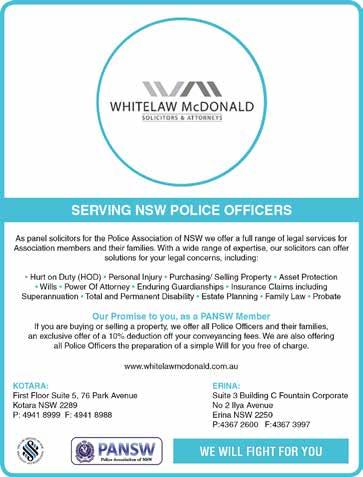
One


20 PANSW Police News July-August 2023
The Hon. Mark Latham MLC & The Hon. Rod Roberts MLC
Authorised by Neil Turner, Pauline Hanson’s One Nation, 3/36 Vincent Street, Cessnock NSW 2325.
Nation NSW recognises the commitment and dedication of the NSW Police Force.
In 2023 One Nation NSW will continue to use our voices in the NSW Parliament to fight in the interests of frontline service workers across the State.
Police officers have rights as well
One of the most important judgements for procedural fairness for NSW police officers
■ In the early hours of 31 May 2011, two police officers located a stolen vehicle. They recognised the two people inside the car from a domestic dispute they had been called to the day before.
An altercation occurred between police and the couple, and in the course of that altercation, an officer's firearm went off, injuring one of the people from the vehicle.
Subsequently, when directed to participate in an interview, the officer informed the NSWPF he would not be participating in any interview about the incident, claiming the common law privilege against self-incrimination.
When he was again directed to participate, the officer commenced proceedings seeking a declaration the directions to participate were unlawful.
With the support of the PANSW, the officer took that matter all the way to the Supreme Court, and on 30 August 2013, secured one of the most important judgements for procedural fairness for NSW police officers. This judgement is still as important as ever today.
What was decided
Police are also protected by the privilege against self-incrimination
The Supreme declared: the officer "was entitled, in the exercise of his privilege against self-incrimination, to refuse to answer questions asked of him by the NSW Police Force”.
"any order directing the [officer] to answer questions concerning the incident … is not a lawful order in circumstances where the [officer] has claimed the privilege against selfincrimination.
Why this matters
This decision ensured that a fundamental right that protects all people also protects police officers. At the time of the decision, then PANSW President Scott Weber declared the result a win for all police officers, saying:
"What this means is that police officers have the same protections as everyone else."
You all play a vital role in protecting the people of NSW. In doing so, you expose yourself to not only physical danger, but also legal risk. You are duty bound to perform actions that, but for your status as a constable of police, would be criminal to perform. You perform those actions in strict accordance with your training, and procedural and legislative constraints. It would make your job much more difficult to require you to perform these actions and provide evidence against yourself.
Every day you put on your arms and appointments, every day you attend a call, or take action in a violent situation, you accept all the accountability that comes with it.
It is only right then that you are afforded the same basic protections as anyone else subject to the criminal justice system.
It is not the policy of the PANSW to prevent accountability when police have committed an offence. However, it is the PANSW's policy that its members have the same rights as the rest of the community and that should be recognised by everyone.
Unfortunately, that is not the case.
Why is this under attack
Ever since the decision upholding your protection from self-incrimination, there have been opponents that have tried to remove it.
In May 2023, the LECC published its report "Five Years (2017 – 2022) of Independent Monitoring of NSW Police Force Critical Incident Investigations", stating:
“Occasionally, directly involved officers have also declined to provide a version of events for the purposes of the critical incident investigation (Table 7). In most of these cases the directly involved officers relied on the privilege against
self-incrimination to decline to provide a version of events.”
It goes on to outline the length of time before such directly involved officers did provide a statement in a Coronial Hearing, and states:
“Where involved officers decline to provide a contemporaneous version of events it hampers the critical incident investigation and also makes the evidence provided at a later date less reliable, given the impact of time on memory.”
Keep in mind – while a directly involved officer may rely on the privilege against self-incrimination to decline to provide a version of events, there is still a hugely sophisticated Critical Incident Investigation being conducted by highly expert investigation teams who obtain a huge amount of evidence from other sources and progress the investigation, regardless of whether the involved officer provides a statement.
Despite this, some have and will seize on these issues raised by the LECC to undermine police officers’ rights and protections. Those same people would be up in arms were those same rights and protections removed when police investigate the suspects of other crimes.
We'll continue to fight for you
The PANSW has always fought to maintain that protection and has been successful for a decade now.
It would also be a major test of a new Government's support for police officers' rights and procedural fairness protections.
Will they give police the confidence to continue to do a dangerous and complex job protecting the community or give in to pressure and remove a fundamental legal right?
We will be there to ensure the Government continues to support you.
PANSW Police News July-August 2023 21 CRITICAL INCIDENTS





22 PANSW Police News July-August 2023 Expert mortgage support, with your local broker. Mortgage Choice Pty Ltd ACN 009 161 979 (Australian Credit Licence 382869) and Smartline Operations Pty Ltd ACN 086 467 727 (Australian Credit Licence 385325) are owned by REA Group Ltd. Your broker will advise whether they are a credit representative of Mortgage Choice or Smartline. Call Steve on 0411 184 884 today. Home loans Equipment & finance leasing Car loans Business loans Property investment Debt consolidation Steve Gregoire m 0411 184 884 e sgregoire@mortgagechoice.com.au w MortgageChoice.com.au/sgregoire We have now rebranded from Smartline to Mortgage Choice. It’s simple, smart and saves Police get more with beCarWise For a competitive edge, try beCarWise today! Visit becarwise.com.au/police or call 1300 734 500 It’s simple, smart and saves you money Are you looking for more with your novated lease? beCarWise is an experienced service provider of novated leases based in NSW. We can provide Police Officers with more finance options, more value and more personalised service. Great discounts off the purchase price of your next new car GST savings on the running costs and price of the car Eligible EVs and Plug-in Hybrids are FBT-Free Tax savings for the life of the lease All running costs included for easy budgeting From plush toys to oldschool wallets. Buy here, buy quality. BEST SELLER: GERMAN SHEPHERD POLICE DOG - $42 - ALSO AVAILABLE IN BLACK or CREAM LAB BEST SELLER: LEATHER WALLET WITH COIN PURSE. CLASSIC BLACK MODEL 112B - $58.80 Police Shop www.policeshop.com.au
Remembering Tara
■ Every legatee comes to NSW Police Legacy in their own way. Senior Constable Sean Tobin has an involvement with the charity that stretches back to the last century. He joined the NSW Police Force in 1991, and didn’t know too much about Police Legacy until 1995, when his Commander at Blacktown (a man known very well to us as Life Member Bob Waites) encouraged him to find out a bit more about the then-young charity.
In 1999, Sean started seeing a young police officer called Tara McLaughlin, whose friend had invited her to be a supervisor on a Police Legacy camp. She went along and enjoyed it so much that she became a regular, volunteering on at least one camp a year after that. After being involved in this way for several years, she became a NSW Police Legacy Board Member in 2007.
Needless to say, Sean’s knowledge of, and appreciation for, Legacy’s work grew over this time, as he heard stories from Tara about the positive affect that camps were having on the kids. “I think she just saw the value in these kids keeping in touch with the police family,” he says. She was there long enough to see the kids grow and mature, and develop the lifelong friendships that truly define our young legatee’s lives.
Tara’s involvement as a camp supervisor
dwindled with the birth of the couple’s first child, Harry, in 2009, and then stopped with the birth of their second, Flynn, in 2011, but she remained active on the Board. Tragically, in 2013 Tara was diagnosed with cancer, and in 2015 she died. She had just qualified for the rank of Sergeant at the time of her diagnosis, but was never well enough to take up the position in an active capacity. She was awarded the rank posthumously.

With Tara’s untimely death, NSW Police Legacy became much more of an active force in Sean’s life. Over the years, Harry and Flynn benefited from education grants, and became active participants in Legacy activities. Harry loves going on camp. Flynn loves the Kids’ Christmas parties. And they both enjoy participating in a ritual that honours their mother’s legacy – the Tara’s Gift Award.
This award was created to honour Tara’s memory and her special connection with the young Police Legatees in her care on camp, and recognises those legatees that display leadership skills and compassion.

The award is presented at the January Adventure Camp by Sean, Harry, and Flynn, and this choice of location is quite a deliberate one.
“The recipient is among their peers when they receive it,” says Sean. “You have some of the younger ones look at it and think, ‘I want that! What do I have
to do to get that?’” It’s a true reflection of Tara’s focus on legatee welfare, and instilling those strong values of leadership and compassion in the next generation.
Sean loves seeing Tara’s memory honoured in this way, and he also loves being able to bring the police family connection to some of the kids who don’t have that so strongly because of the loss of their police parent. When he went out to present the award this January, he went across to the camp on a police boat, and one of the crewing officers was able to tell a young legatee that he used to work with his dad. “He just lit up,” says Sean, smiling at the memory, “That stuff is so important.”
Sean wants to break down the old stereotype that still persists. When people hear that a child has lost a police parent, they mainly assume it was the father who was serving. “I think a lot of fathers would get a lot out of it if they brought their kids along to Legacy,” he says. While he knows that everyone at NSW Police Legacy is pushing to make that change too, he’d like to see it taken up by more male parents who’ve been left behind. Sean, we’re with you one hundred percent, and we feel your gift might be as invaluable as Tara’s.
Tim Sinclair NSW Police Legacy Marketing and Communications Manager
PANSW Police News July-August 2023 23 LEGACY
(MAIN) SENIOR CONSTABLE SEAN TOBIN WITH HIS SONS FLYNN AND HARRY. (INSERT) SERGEANT TARA MCLAUGHLIN WITH HER BOYS CIRCA 2014.

■ NSWPF Superintendent Rob was on holiday with his family in Hawaii when his wife discovered a lump.
The days that followed the diagnosis were a blur.

In the days that followed, the PANSW’s Welfare Coordinator reached out to Rob and put him in touch with CancerAid, which was recently rebranded as Osara Health.
With a new name that reflects an empowering focus on individuals not being defined by their diagnosis, the program still offers the same fantastic support service for PANSW members and their immediate families.
Joining the Cancer Caregiver program, Rob was able to access a specialized program designed by oncologists to equip people with the support, information and skills to best look after their loved one living with cancer and improve their clinical outcomes.
He gained access to:
• A dedicated Health Coach for support and education with scheduled calls over 6-12 weeks
• Weekly educational modules based on the specific caregiving challenges affecting you and your loved one (for
example, how to get equipped with relevant information, balancing your loved one’s needs with your own, fear of prognosis and living with uncertainty, relationships, adjusting to your new role)
• Resources that provide practical strategies to improve your ability to look after your loved one while looking after your own physical and mental health
• Access to the Osara Health app so your loved one can track their symptoms and manage their diagnosis.
Along with being able to bounce any questions off a trained professional, Rob said it was also beneficial to vent when the emotional weight of the situation became too much for him.
“It was good to speak to someone external to my family, someone who was there just for me.”
Statistics from the Australian Institute of Health and Welfare show that 40% of people diagnosed with cancer are working age, and 10% of those within the workforce are caregivers at any given time. PANSW President Kevin Morton said that the partnership allowed The Association to expand its capabilities in supporting its members.
“I’ve got a membership base of 17,000 people. With that sort of workforce, some of my people are going to be affected.”
“Through the expertise of Osara Health, they’ve been able to provide this opportunity for me to continue my mantra of looking after the welfare of our members.”
Rob praised the program and even referred the PANSW to other members that needed assistance. He was grateful that the additional support allowed him to remain at work while supporting his wife.
"The Caregivers program gave me that advice to make sure I kept exercising regularly and eating well. I still wanted to stay at work…it's something I love doing and this program allowed me to stay at work and to still function fully."
“I am very thankful to the Police Association of NSW that they referred me to the Osara Health program.”
To learn more, visit the Member Benefits section of the PANSW website.
My first thoughts were, ‘this is not happening to us.’
PANSW Police News July-August 2023 25 MEMBER BENEFITS
“You’re sitting there with your partner, who you love more than anything in the world, and the doctor is saying to them, ‘It’s not good news. You’ve got breast cancer.”
Carer’s Leave & Caring for your family member when ill
Aleksandar Boromisa PANSW Industrial Officer - Specialist Commands
■ The PANSW regularly receives enquiries about entitlement to the FACS/Carer’s Leave when a family member requires care due to a medical issue. For example, this often occurs when your partner has given birth through caesarean section and requires care and support. These enquiries are usually made after the fact has occurred, the member has already returned from absence, and there is a dispute about what type of leave is applicable. This article aims to provide information that you need to have to avoid your leave being declined and prolonged industrial disputation.
What is the difference between FACS and Carer’s Leave? Which one should I claim?
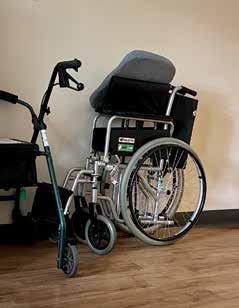
Family and Community Service
Leave (FACS) is a provision that allows members to take leave in the case of emergencies or personal or domestic circumstances. Such circumstances include compassionate grounds, accommodation matters (moving residence), emergency and weather conditions (i.e., floods, bushfires etc.), citizenship ceremonies, parentteacher interviews and related school attendance. Members are entitled to 19 hours of FACS leave in their first year of service and five working days every two years.
Carer’s leave (or sick leave to care for a family member) is applicable once the FACS leave is exhausted and in circumstances where a family member (as defined by the Police Award) is ill and requires care or requires care due to an emergency. In those circumstances, you may elect to use your accrued sick leave. FACS leave has a broader application, and there is a requirement to exhaust the FACS leave before using carer’s leave. Hence, you should always exhaust your
entitlement to the FACS before you can use carer’s leave.
Am I entitled to the FACS/ Carer’s Leave when I am on annual leave?
Members often give notice/apply for annual leave in the lead-up to their partner giving birth (or requiring other medical care, such as after surgery). It is a common-sense thing to do, allowing your Command to plan for your absence in advance. However, this may work against you if your partner/family member becomes ill and you wish to take FACS/Carer’s leave.
It is particularly likely to happen if, for example, a member’s partner is expecting a child and the birth is anticipated to take place naturally. However, sometimes circumstances change; what should have been a pleasant and joyful absence to spend time with your new extended family can involve caring for your partner, other children or both. Members will
often continue with their approved annual leave until they can return to the workplace and then attempt to retrospectively claim FACS/Carer’s leave. Unfortunately, the NSWPF has a position that if a member is already on a form of leave (i.e., annual leave), they do not require absence from the workplace; hence, any such application would be declined. While the PANSW strongly disagrees with this interpretation, following a few simple steps is important to avoid lengthy and unnecessary industrial disputation.
If you know that you will need to provide care for a family member who is ill/incapacitated and requires care, then the PANSW advises you not to apply for annual leave. Instead, particularly in the case of an expected caesarean section birth, you would be well advised to apply for two weeks of parental leave. Should it become apparent that your family member requires care, you should then apply for the FACS/Carer’s Leave, supported with relevant medical evidence. Should the care not be required, you can seek access to further parental leave.
If you have already applied for annual leave, you should contact your relevant Commander or Manager and advise them that you wish to cancel your annual leave and will apply for the FACS/Carer’s leave. This action should be done before your annual leave period commences, if possible. We advise you to call first and follow up your call with an email.
How do new Parental Leave provisions affect the FACS/ Carer’s Leave?
Similarly to annual leave, if you seek a period of parental leave and that leave commences, your employer (the NSWPF) will not allow you to convert that leave
26 PANSW Police News July-August 2023 FACS CARER'S LEAVE
to FACS/Carer’s leave. Again, the PANSW disagrees with this interpretation, but this is the position of the NSWPF.
Under the new provisions, both parents are entitled to 16 weeks of leave which can be taken within two years of the child’s birth/adoption. As a parent, you are not required to take leave at the time of birth if that does not suit your needs.
The PANSW would advise against putting more parental leave than you intend to use, specifically if there is an indication that you will be required to provide care for your partner or child.
For example, if you apply for and use one or two weeks of parental leave at the time of birth and are required to provide care, a separate application for FACS/ Carer’s leave, supported by medical evidence, will need to be made. If you are already on a period of leave when the care is required, the position of NSWPF will be to decline any carer’s leave.

I am entitled to six weeks of carer’s leave, right?
It is a common misconception that members are entitled to a standard grant of six weeks of the FACS/Carer’s Leave. The entitlement to the FACS/Carer’s Leave is contingent on you proving, by way of medical evidence or other suitable evidence, that you are providing care for a family member who is ill and requires care (in the case of the carer’s leave) or that you are exercising your family responsibility (in case of the FACS leave).
It has been determined through industrial disputation at the Industrial Relations Commission that medical evidence needs to be provided at least fortnightly. If a certificate states that the family member is unfit for six weeks, your leave application may be declined.
Medical certificates
In case of short absences (up to two weeks), medical certificates need to, as a guide, provide the following information:
1. Relationship of the family member to the officer
2. Nature of the family member’s illness
3. Whether the illness is such as to require the family member to need care and support
In case of more extended absences (more than two weeks), medical certificates need to, as a guide, provide the following information:
1. Relationship of the family member to the officer
2. Nature of the family member’s illness
3. That the illness is such as to require full-time care and support by another person.
If medical certificates are backdated or do not contain the prescribed
information, the NSWPF may dispute your entitlement to the FACS/Carer’s Leave. There is also an understanding between the NSWPF and the PANSW that the relevant Commander or Manager must advise you of the requirements for medical certificates when you enquire about claiming the FACS/Carer’s leave.
Seek advice before you act
The Industrial division of the PANSW often receives these types of enquires after the member has returned to the workplace and is trying to convert the annual/parental leave to FACS/Carer’s leave or they had been declined carer’s leave because the certificate was not appropriate. Our ability to represent the member effectively may be limited in those situations as the facts/documents cannot be retrospectively changed. It is essential that if you are unsure about your entitlement or need any advice, you call our Information Organising Centre before you act.
PANSW Police News July-August 2023 27 FACS CARER'S LEAVE
It is a common misconception that members are entitled to a standard grant of six weeks of FACS Carer’s Leave.
Run4Blue
■ On Wednesday 24 May, NSW Police Force Academy hosted a special Run4Blue event in Goulburn. Fresh-faced students took their best grab for the dreaded red ball and practised the famous five D’s of dodgeball: ‘dodge, dive, dip, duck and dodge!’. Adding to their cardio for the day, the new recruits then jumped onto the track to jog or walk it out as part of the continuous relay, shadowed across the country by their counterparts in Western Australia and Victoria.
As if the threat of losing to your own classmates wasn’t pressure enough, Deputy Commissioner Ackley and competitors from the Dog Unit, Traffic and Highway Patrol Command, and the recruits from the Australian Federal Police were on hand to ensure the participants remained on their toes.
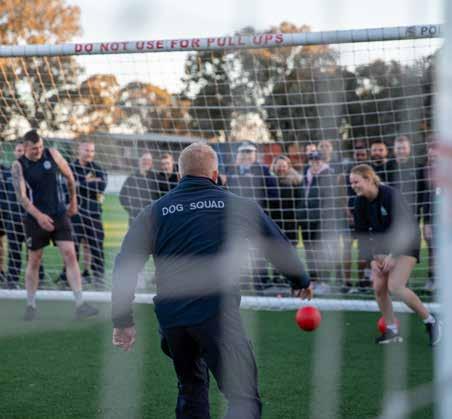
The event raised more than $11,000 for NSW Police Legacy, which supports the families of police officers who make the ultimate sacrifice.
As a proud supporter of the event, the PANSW was well represented by Vice President Ian Allwood, Welfare Coordinator Ian Johnstone, Lead Organiser Jon Goddard and Organisers Nikki Lucaci and Jeff Ludkin.
2023 PANSW Women’s Forum
2-3 November, Park Royal, Parramatta
To register your interest, please contact the IOC 9265 6777 or via email (info.centre@pansw.org.au)
#EmbraceEquity

28 PANSW Police News July-August 2023 RUN4BLUE
Day,
the date
your calendar and
us for the PANSW Women’s
later this year.
In celebration of International Women’s
save
in
join
Forum
1 2 3 4 5 6 7 8 9 10 11 12 13 14 15 16 17 18 19 20 21 22 23 24 25 26 27 28 29 30 NOVEMBER M T W F S T S 4 5 11 12 18 19 25 26 NOVEMBER M T W F S T S
Mal Unicomb Wall-to-Wall
■ The 2023 Wall to Wall Ride for Remembrance takes place on Saturday 16 September. The main ride starts in Sydney’s Domain, but some riders begin much earlier.
These individuals and groups will set off from far away locations throughout regional NSW and even interstate, where they will join the ride at the start in Sydney or the finish in Canberra.
For many PANSW Associate Members, the Wall-to-Wall ride is a once-a-year opportunity to meet up with friends and former colleagues.
This year, PANSW Police News has appointed an Associates Correspondent, who will try to take us behind the scenes of the ride.
Retired Senior Sergeant Mal Unicomb APM retired in 2017 after a 43-year career. Mal has been around motorcycles for decades, becoming a police innercity cyclist in 1975.
In 1977 Mal transferred to the central west town of Coonabarabran. He can still
be found there most of the time, except for mid-September when he sets off on his Wall-to-Wall ride.
“The Wall-to-Wall Ride has become the most important event on many ex-cops social calendars,” retired Senior Sergeant Mal Unicomb said.
Mal said the ride helps associate members feel connected to today’s police family.
“It keeps the memory of fallen officers from our era alive,” Mal told PANSW Police News
“It’s also a way for us, as retired and former police, to show our support for today’s serving members.
“We share the loss felt by current serving police and their families when we read the names of police officers on the NSW and National Police Memorials that weren’t there last year.

For this year’s ride, Mal will again head off from Coonabarabran, meeting up with fellow travellers along the way.
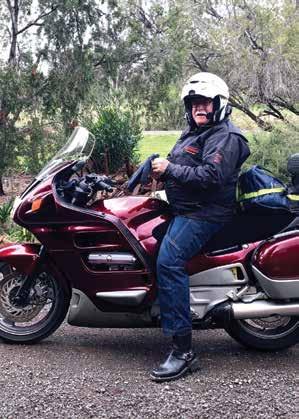
Safety is the top priority for the former
veteran Highway Patrol officer and Western Region Traffic Coordinator, as evidenced from the photo of Mal and his motorcycle.
“The servicing of the bike, the choice of clothing, as well as the route selection and journey planning is done well in advance,” Mal said.
“It really is a safe system.”
Every aspect of Mal’s journey is planned. His touring party will head for the National Police Memorial in Canberra, where they will meet up, on Saturday 16 September, with the main body of riders who left Sydney that morning.
Highlights and photos of Mal’s ride will be posted on the PANSW Facebook page. The November-December issue of PANSW Police News will feature Mal’s wrap-up of the 2023 Wall-to-Wall ride.
Established in 2009, the story of how the Wall-to-Wall ride started can be found at: walltowallride.com/the-ride/ about/.
We catch up with Mal Unicomb as he prepares for the 2023 Wall-to-Wall Ride.
PANSW Police News July-August 2023 29 ASSOCIATES
(L) MAL UNICOMB RECEIVING HIS PANSW WATCH FROM THEN-EXECUTIVE MEMBER MICK BUKO ON THE DAY OF HIS RETIREMENT ON 2 JULY 2017. (R) MAL AND HIS MACHINE: SAFETY IS TOP PRIORITY.
Peter Jones of Eugowra
The life and career of Peter Jones, and his fight to keep it all above water.
Mick Timms PPN Writer
■.On 19 June 1972, 22-year-old Peter Jones was attested as a Probationary Constable at the NSW Police Academy, Redfern. But the skilled horse rider from Eugowra had to jump over several hurdles to get there. “I was under the weight limit that existed at the time, which delayed my application,” Peter Jones told PANSW Police News
“Fortunately, they needed my horseriding skills, so I spent the first five years of my service at the Mounted Police. I was part of NSW Mounted Police teams that won tent-pegging competitions, including state championships."
Peter came from a large country family with 13 brothers and a solitary sister. Along with Mum and Dad, the family slept in a two-bedroom house with an enclosed veranda. His father was a shearer. Peter was schooled locally in Eugowra and worked several jobs in town before joining NSWPF.
In 1977 he moved back to the Central West, this time at Cowra, less than an hour from Eugowra. “While I was never stationed at Eugowra, there were occasions where I was called in to help the local copper out,” Peter said.
From the St George Dragons footy socks worn under his trousers to the winter uniform tie he wore throughout the year, Peter is well known for his 21 years attached to Cowra Police Station. He was promoted to Sergeant in 1987.

Peter led from the front and attended
dozens of serious incidents over the years. In 1998, he transferred to Tumut, where he earned a Region Commander’s Citation for arresting a man firing a shotgun.

When he retired in 2005, Peter came home to Eugowra and became active in the local community.
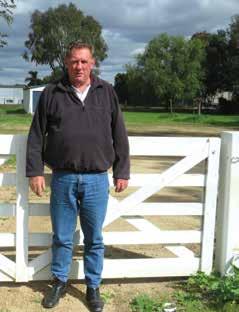
Peter Jones was recognised by Harness Racing NSW with the 2018/19 Club Volunteer Appreciation Award.
In 2019, he received a Eugowra Community Appreciation Award for his ongoing support of the Eugowra and District Community. As a passionate car enthusiast, Peter continues to maintain the grounds and track at the Eugowra Harness Racing Club.
-
On 14 November 2022 a major flood hit the town of Eugowra and Peter's natural instincts for family, community, and service came to the fore.
At daybreak on monday 14, a wall of water flooded the town. At 9am Peter received an urgent call from one of his brothers. "He told me to get out. I told him I'd get sandbags, but my brother said, it's too late for sandbags – get out."
32 Years
Dinosaurs walk amongs us
■ (L) PANSW Executive Member, Senior Constable Oliver Behrens presents Sgt Jason France with his NSW Police Association watch upon retirement after 32 yrs service. Jason attested in January 1991. (R) Mounted on the board is an acknowledgement of Sgt France's true dinosaur status. He will leave behind a big hole.
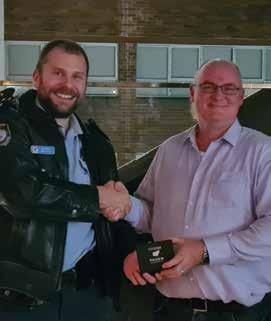
30 PANSW Police News July-August 2023 ASSOCIATES & RETIREMENT
A SOLITARY GATE WHERE THERE WAS ONCE A HOME
Waters would eventually lap under the floor of Peter's house, fortunately causing only minor damage - but, sadly, his brother's house was destroyed.
Local police and emergency services vehicles and premises were among the first and hardest to be hit. Locals were rescuing people from flooded houses, putting them on boats and trucks.
"They tied ropes around themselves and went house-to-house," He said. "One of my brothers and his wife almost drowned when the ute they were rescued in was swamped with water. Fortunately, they were rescued a second time.
It wasn't long before Peter's police training kicked in, and he tried to get resources in to help the town. "I was finally able to contact Triple Zero, who did not believe or understand the extent of the emergency," Peter said. "I was told by the Triple Zero operators it was not a major flood. That part was right. It wasn't a flood, it was a tsunami.
"We had 150 people up on roofs needing to be rescued. I called several times requesting helicopters. One finally arrived and it was followed by others."
When the emergency was over, two Eugowra residents lost their lives.
"If it had occurred in the middle of the night, hundreds of people would have been killed," Peter said.
The isolated town had no mobile phone coverage for several days after the flood. Some rescued people, such as Peter's brother and sister-in-law, were taken to an evacuation centre in Orange. For others, the pavilion of the local showground was the only available shelter. "I was thinking for three days –will I or won't I?" Peter said.
Then, a fortuitous meeting with a TV news reporter forced Peter's hand.
"When I asked if I should come forward and talk to the media about the situation in town, the reporter told me the Premier was arriving in ten minutes," Peter said. "Within days, we got councillors, money for residents, and support from Resilience NSW," Peter said.
Mr. Perrottet made a subsequent visit to Eugowra with Prime Minister Anthony Albanese. "I'd already said my piece and wanted the local civilians who risked their lives to rescue people to meet the PM," Peter said.
"The Premier reached out a few weeks after to see how things were going, which I appreciated."
Peter continues to be an advocate for the townspeople. "People, particularly the elderly, who can't convey the message themselves, have asked me to speak to insurance companies on their behalf," He said.
"On Anzac Day, we held a harness racing meeting which raised money and was good for the morale of residents.
Peter Jones was interviewed for this article in May 2023, about six months after the flood. The interview included Peter's guided tour of the town, including a house that used to belong to him, which was sitting on a house-moving trailer. "The force of the water picked the house up off its foundations and moved it 400 metres," Peter said.
In another street stands a solitary front gate on a vacant block where a house belonging to another of Peter's brothers once stood. "You can see the physical damage done by the flood and the people living in pods and caravans on their properties," Peter said. "What you can't see is the mental trauma that people are still going through.
"My brother and his wife, who were rescued, have since moved to another town and will never be back – it's just too upsetting," Peter said.
"People are now seeing their houses taken away on tipper trucks – it has to be traumatic. Crime, including break and enters at the few remaining retail premises, is also occurring."
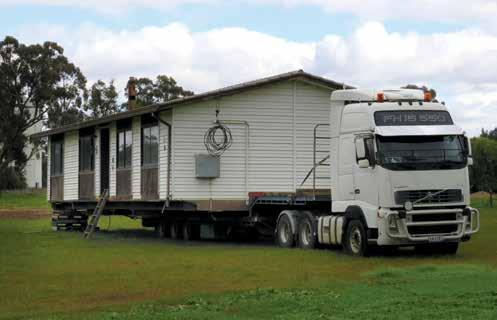
"I'm disappointed agencies or governments have not sought feedback regarding the flood, the recovery, or even held a town meeting. People aren't going to ask for help, but the town needs counselling support."
"Knock on doors and talk to people about what has happened. Find out how they are really travelling.
"Finally, the bravery and lifesaving actions of locals, who are not members of any organisation, needs to be formally recognised."
"I'm disappointed agencies or governments have not sought feedback regarding the flood"
PANSW Police News July-August 2023 31 ASSOCIATES
A HOUSE THAT ONCE BELONGED TO PETER, NOW SITS ON A TRAILER
In Conversation Alison Dixon
Detective Sergeant Alison Dixon discusses Police Super with PANSW Secretary Pat Gooley
Pat Gooly: Alison, tell us a bit about yourself.
Alison Dixon: My name's Alison. I've been in the New South Wales Police Service for 21 years. Prior to that, I was primary school teacher. I'm married with two children aged nine and five. I'm currently a detective managing a staff of about 30. The work we do is extremely dangerous at times. In the last 21 years, I've seen many horrendous things, both in general duties and in detectives.

PG: How would you describe the injury rates in policing compared to other occupations?
AD: It's a high injury rate both physically and mentally. The job takes its toll on people.
PG: Are you aware of how you are insured by your employer?
AD: It's a very expensive product. Paid
Into our super, then it goes straight back out into the insurance company.
PG: Are there's ramifications to that?
AD: It causes us to breach the concessional cap. It makes our wages for the next year highly inflated and it looks like we earn more money than we actually do.
PG: Are you aware of some of those things police have ruled out by an artificially inflated income?
AD: It's causing us to miss out on things like paid parental leave, daycare rebates, private health insurance rebates. It impacts not only me but other police families, single parent police families, all families across the police force.
PG: You'd be aware the Commissioner of Police went to Canberra and lobbied federal politicians from all sides, particularly NSW members. Have you
meal-break crossword indigenious round
got a message for them about this issue?
AD: Yes. Fix it.
Meal Break Crossword clues
Down 1. The art of reading disturbances in the environment to find a lost person or thing (8).
2. Portrait of David Gulpili won which NSW art prize? (9)
3. Traditional wood wind instrument (10)
4. He invented the modern method for shearing sheep and is commemorated on our $50 note. (12) (2 words)
5. What 2021 national survey put Australia’s aboriginal population at 3.2% (6)
11. The little white girl who sang alongside Yolngu songman Djakapurra Munyana, in the opening of the 2000 Sydney Olympics (12 )(2 words)
12. First nation of the Sydney basin area? (4)
13. Shared stories employing travel routes, mythology, art, song and dance; connecting indigenous people to each other, and country. (9)
14. Earliest example of heavier-than-air, human made flight. Employs an aerofoil to return. (9)
15. The Aboriginal Dance Theatre company that's called Sydney home for +30 years. (8)
16. South of Sydney, the town’s name originates from ‘woolyungah’ meaning five islands. (10)
17. 1868 an historic team of 13 aboriginal men toured England playing what game? (7)
19. Past epoch of creations myths.(9)
Across 6. Ayers Rock’s original name (5)
7. 400m gold at the Sydney Olympics. (12) (2 words)
8. Aboriginal slang term for making unreasonable or excessive demands from family or associates (10)
9. Neville Bonner was Australia’s first elected indigenous member of Federal Parliament. From which party? (7)
10. His name is synonymous with a high court ruling on land-rights.(4)
11. Largely aboriginal infantry regiment based in the Norther Territory. (8)
14. Important interlocular in the early NSW colony. Opera house restaurant's name. (9)
18. Arthur Beeton’s mother was a member of which group defined by their removal from family because of mixed race (16) (2 words)
20. Inherited traditions, habits and ideas.(8)
20 21 22 23 24 25 26 27
CONVERSATION
32 PANSW Police News July-August 2023
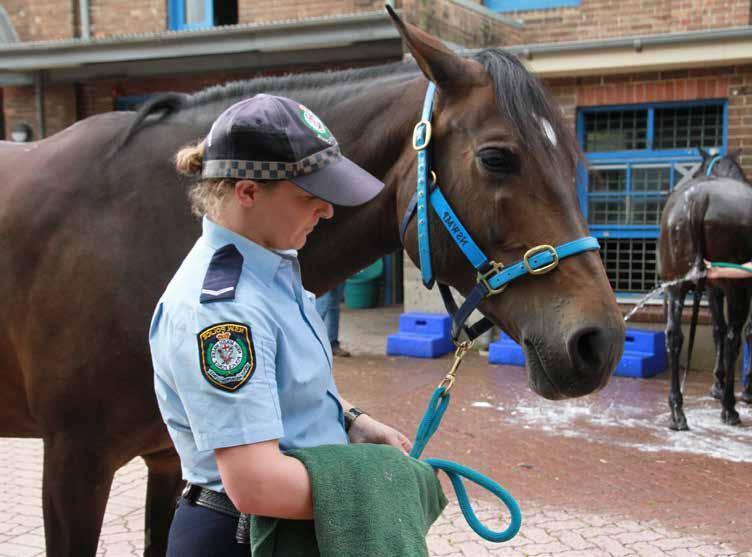
We believe we’re the best health insurer for Police and their extended families. As a not-for-profit provider we specialise in top-level cover, providing great value for money and complete peace of mind. Our hospital cover has no excesses, exclusions, or co-payments and we pay 80% back on most Extras services.* Our fund was voted #1 of all private health funds in Australia in these categories.^ Police Health Limited ABN 86 135 221 519. A registered, not-for-profit, restricted access private health insurer - first established in 1935. © Copyright. *Subject to waiting periods, annual limits and other conditions. Providers must be recognised by Police Health. ^IPSOS Healthcare & Insurance Australia research survey conducted in 2021. Scan the QR code to compare our cover or call us on 1800 603 603 for more information. “ They are one of the best, if not the best in paying out benefits for extras cover such as dental and optical. ” Ingrid, NSW
WE PUT MEMBERS BEFORE PROFIT

HOME & INVESTMENT LOANS For your home sweet home Terms and conditions apply and are available on request. Fees, charges and lending criteria apply. Police Bank Ltd. ABN 95 087 650 799. AFSL/Australian Credit License No. 240018. 25 Pelican Street, Surry Hills NSW 2010. Settle in sooner with an award-winning Police Bank Home or Investment Loan. Competitive rates No monthly or annual fees Call 131 728 or visit policebank.com.au











































 COMPETITORS IN RUN4BLUE'S CONTINUOUS RELAY LOOP AROUND GOULBURN POLICE ACADEMY'S TRACK
(MORE ON PAGE 28) / PHOTO CREDIT: SENIOR CONSTABLE ROSE GUEST MEDIA UNIT, NSW POLICE FORCE ACADEMY
COMPETITORS IN RUN4BLUE'S CONTINUOUS RELAY LOOP AROUND GOULBURN POLICE ACADEMY'S TRACK
(MORE ON PAGE 28) / PHOTO CREDIT: SENIOR CONSTABLE ROSE GUEST MEDIA UNIT, NSW POLICE FORCE ACADEMY



























